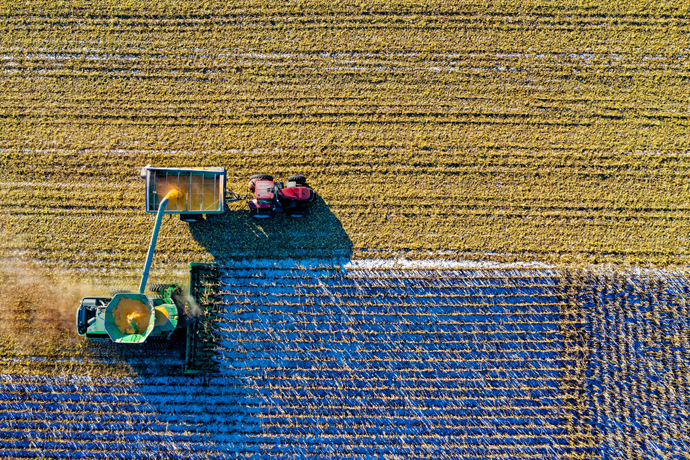by Bruce Dudley, Senior Vice President at GLOBE Series and The Delphi Group
Agtech, also known as agritech, is any technology or application that ensures agricultural practices are more efficient, productive and/or safe. Think the production of higher yields using fewer resources, reducing waste or pesticide use, or improving food safety and animal health and welfare.
Agriculture is ripe for the picking when it comes to disruptive technology. Other large industries, such as mining, forestry and transportation are already well down the path of transformation. The need for innovation in the ag sector is only going to increase, and here’s why:
- Food demand is growing. The population is projected to grow to 9.7 billion people by 2050, up from 7.6 billion today. According to the FAO, global agricultural demand is expected to rise by 70 percent by 2050 as a result.
- Available land is shrinking. Arable land is decreasing by 100,000 hectares per year. Climate change and mass urbanization will shrink the availability of arable land even further, according to the World Economic Forum.
- GHG emissions are on the rise. Agriculture, forestry and changes in land use together produce 21 percent of global greenhouse gas emissions, making them the second largest emitter after the energy sector, according to the FAO. Emissions could increase an additional 30 percent by 2050.
- Canada has a lot to gain. Canada is one of the world’s largest agricultural producers and exporters. According to the Canadian Agri-Food Trade Alliance, Canadian agricultural exports total $56 billion a year and the sector employs one in eight Canadians. As a trusted producer of sustainable produce, Canada’s brand will be in high demand.
The Trend to Watch
The future of agtech is precision agriculture. This includes using remote sensors and real-time data so that farmers only deploy water, nutrients and fertilizer where they’re needed, when they’re needed. It means using drones, satellites and in-field sensors to monitor soil conditions and indicate optimum planting times. And it means using smart machinery and transportation networks to make and distribute food products.
A recent McKinsey & Company report on big data applications for agriculture stated that, according to 2014 estimates, the global market for agricultural robotics is expected to grow from its current $1 billion to $14–18 billion by 2020.
Not only will agtech reduce costs for farmers (many of whom run small to medium businesses) and result in fewer resources being used, but it will reduce the risk of over-fertilizing and the related costs to our environmental health. You only have to look at the recent romaine lettuce scare to realize the potential impact.
Automation is also positioned to transform the sector. For example, wasted food is a huge issue in Canada and the U.S. because we don’t have sufficient labour and resources to get produce to market – the UN conservatively estimates that about 17% of food grown in North America is lost or wasted on the farm. This represents tremendous stranded value for the producer.
Robots, autonomous vehicles and equipment that can be deployed in the fields 24/7 will not only increase productivity, they will reduce food waste and improve safety. This is extremely important when you consider that, according to the Center for Disease Control and Prevention, agriculture ranks among the most hazardous industries and farmers are at very high risk for fatal and nonfatal injuries. Technology has real value to add.
Supporting domestic production is important, but it is even more important to develop safe processes and secure food quantities in developing countries. Precision ag for countries like Mexico as well as regions in Asia and Africa is going to be very important given limited access to resources like water, fertilizers and energy for processing and safe storage.
The Opportunity
Globally, the case for agtech is pretty clear. Here in Canada, the government has set an ambitious target to grow its agri-food exports to at least $75 billion annually by 2025. According to Innovation Science and Economic Development Canada, bolstering technology adoption and advancing digitization in the sector is key to achieving this goal.
Agtech is attracting a diverse range of investors who recognize that the sector needs to innovate to meet the challenges of the 21st century. According to Finistere Ventures, a venture capital firm dedicated to the agtech market, the interest in precision and digital agriculture has grown tremendously in the last few years. Most investors are still seeing agtech opportunities at the early stage, and valuations seem to be trending upward. While there were 76 investments totaling $309 million in 2013, in 2014 this grew to 153 investments and $666 million, and $1.4 billion in 2015. This is likely just the tip of the iceberg.
Agtech is at the leading edge of disruption that will transform the way we produce food and move it to market. Canada is on the front edge of that transformation and, with our existing reputation as a global leader, there are incredible opportunities for clean growth and value creation.
Bruce Dudley is a Senior Vice President with The Delphi Group and GLOBE Series. Join Bruce and hundreds of investors, innovators and business leaders at GLOBE Capital (February 27-28 in Toronto) to learn more about digital agriculture and other opportunities in the clean economy.
GLOBE Capital returns to Toronto on February 27-28, 2019.
Join us at GLOBE Capital 2019 (February 27-28, Toronto) where we will be discussing the potential for innovation to enhance productivity, improve efficiency, and reduce waste in the agriculture sector, and the impact this has on the investment community, in our session Opportunity Spotlight: Digital Agriculture.




